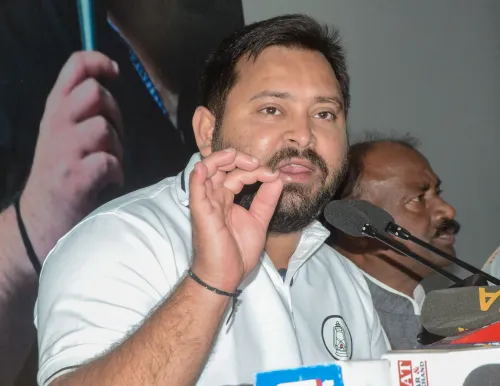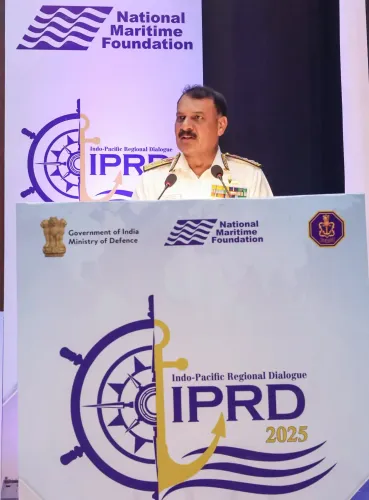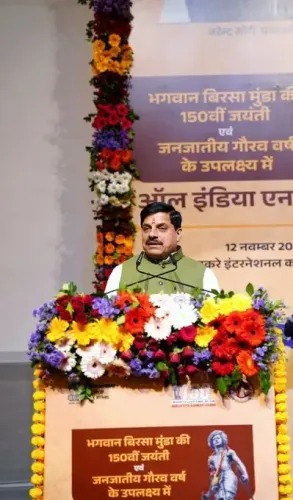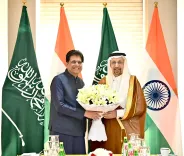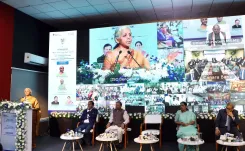How Can the Multilateral System Remain Credible Amidst Rising Climate Risks?

Synopsis
Key Takeaways
- TERI's publication highlights the need for reforming global climate governance.
- Collaboration among nations is crucial in tackling climate change.
- Innovative solutions like repurposing existing UN structures can enhance climate action.
- The role of COP presidency is vital for catalyzing ambition.
- Inclusive participation is necessary for effective climate governance.
Belém (Brazil), Nov 12 (NationPress) The Energy and Resources Institute (TERI), based in New Delhi, has introduced its latest publication, Act4Earth COP Compass, titled 'Strengthening Multilateralism on the Road to COP33 and Beyond', during a high-profile side event at COP30, themed 'Beyond 2025: A New Climate Multilateralism?'.
The session, held at the Blue Zone in Belém, featured Shailly Kedia, Director and Senior Fellow at TERI, as the keynote speaker, addressing the pressing necessity for reforming the global climate governance framework.
The 30th annual United Nations climate change conference (COP30) commenced this week in the Brazilian city of Belém, attracting 50,000 participants from over 190 countries, including diplomats and climate experts, and running for 11 days.
TERI’s policy brief, authored by Abhilash Kolekar, Shailly Kedia, and Ishita Srivastava, and reviewed by R.R. Rashmi, argues that the existing multilateral framework, while critical in promoting global collaboration, must transform to retain its credibility and effectiveness in light of rising climate risks and increasing implementation gaps.
In her address, Shailly Kedia stressed, “A new multilateralism is not about dismantling the current system; rather, it’s about bolstering global cooperation in accordance with the demands of climate science. This new paradigm must not only enhance UNFCCC-related processes but also engage a wider multilateral framework.
“For example, repurposing the UN Trusteeship Council to protect the global commons such as the high seas and the Central Arctic Ocean can safeguard some of the most vulnerable ecosystems on our planet.”
Cecilia Kinuthia-Njenga, Director of Intergovernmental Support and Collective Progress at UNFCCC, emphasized the necessity for enhanced multi-level governance, stating, “Our goal is not to compete against one another; we must unite to combat the climate crisis.
“Multilateralism is dynamic, not unchanging. We require collaborative, action-driven politics that bridge global decisions with local realities.”
Ethan Spaner, International Policy Senior Advisor at The Climate Reality Project, highlighted the significance of COP presidency and multilateralism, asserting, “Presidencies can drive ambition by focusing on science, refining processes, and linking commitments to tangible outcomes. Building trust and fortifying the COP as a leading multilateral platform for climate action during this crucial time starts with a COP president who exemplifies leadership.
“This entails excluding fossil fuel interests that disregard climate action, committing to science-based solutions, and including those most affected by the crisis in the dialogue. A COP President has an unparalleled chance to define ambition and set a precedent for future COP leaders.”
R.R. Rashmi, Distinguished Fellow at TERI and India’s former Principal Climate Negotiator at UNFCCC, remarked, “The multilateral system today encounters significant pressure and, some may argue, an existential threat. Increasing efforts are being made in various circles to undermine or disrupt it. This necessitates a renewed sense of caution and contemplation about the future of multilateralism, not just in tackling climate change but across the entire spectrum of global governance.”
Abhilash Kolekar, Research Associate at TERI and lead author of the policy brief, stated, “As the climate crisis escalates, the effectiveness of UNFCCC will hinge on its capacity to adapt to shifting scientific realities, ensure inclusive participation, and tackle challenges that transcend national borders.
“Strengthening multilateral climate governance through timely and equitable reform is not just favorable; it is imperative.”


